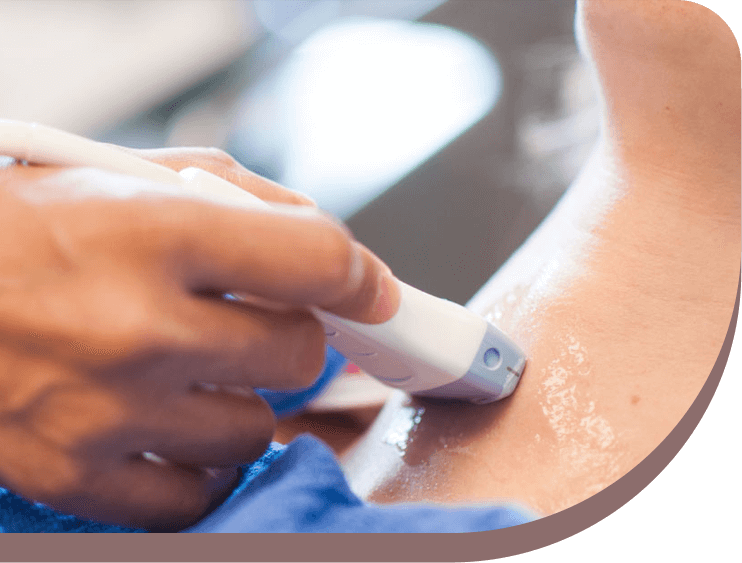
Goiter Causes & Treatments
Goiters – About
Goiter (GOI-tur) is an enlargement of your thyroid gland and is often referred to as enlarged thyroid. Goiters can be caused by diffusely enlarged thyroid glands, or glands that are filled with nodules. Your thyroid is a butterfly-shaped gland located at the front of the neck just above where your collarbones meet. The gland makes the hormones that control the way every cell in the body uses energy (your metabolism). Although goiters are usually painless, a large goiter can cause a cough and make it difficult for you to swallow. In severe cases a goiter can make it more difficult to breathe.
Globally, iodine deficiency is the most common cause of diffuse goiter without nodules. In the United States, where the use of iodized salt is common, a goiter is more often due to the over or under production of thyroid hormones or to nodules that develop in the gland itself. A goiter does not always mean that the thyroid gland is malfunctioning. A goiter can occur in a gland that is producing too much hormone (hyperthyroidism), too little hormone (hypothyroidism), or the correct amount of hormone (euthyroidism).
Treatment depends on the size of the goiter, your symptoms and the underlying cause. Small goiters that aren’t noticeable, and don’t cause problems, usually don’t need treatment.
Goiter – Diagnosis
Your doctor may discover an enlarged thyroid gland simply by feeling your neck and having you swallow during a routine physical exam. In some cases, your doctor may also be able to feel the presence of nodules.
It is important to determine the cause of the goiter. As a first step, you will likely have thyroid function tests to determine if your thyroid is underactive or overactive.
A hormone test. Blood tests can determine the amount of hormones produced by your thyroid and pituitary glands. If your thyroid is underactive, the level of thyroid hormone will be low. At the same time, the level of thyroid-stimulating hormone (TSH) will be high as your pituitary gland tries to stimulate your thyroid gland to produce more thyroid hormone. Goiter associated with an overactive thyroid usually involves a high level of thyroid hormone in the blood and a lower than normal TSH level.
An antibody test. Some causes of goiter involve production of abnormal antibodies. A blood test may confirm the presence of these antibodies.
Ultrasound. A wand-like device (transducer) is held over your neck. Sound waves bounce through your neck and back, forming images on a computer screen. The images reveal the size of your thyroid gland and whether the gland contains nodules that your doctor may not have been able to feel.
A thyroid scan. During a thyroid scan, you’ll have a safe radioactive isotope injected and a special camera produces a computerized image of your thyroid. Thyroid scans provide information about the functional status of your thyroid gland, and are often obtained in conjunction with an Endocrinology evaluation.
A biopsy. During a fine-needle aspiration biopsy, ultrasound is used to guide a needle into your thyroid to obtain a small tissue or fluid sample for testing.
A number of underlying conditions can cause your thyroid gland to enlarge. Among them are:
Graves’ disease. Antibodies produced by your immune system mistakenly attacks your thyroid gland, causing it to produce excess hormone causing the thyroid to swell.
Hashimoto’s disease. Like Graves’ disease, Hashimoto’s disease is an autoimmune disorder. But instead of causing your thyroid to produce too much hormone, Hashimoto’s damages your thyroid so that it produces too little (hypothyroidism). Your pituitary gland then produces more thyroid-stimulating hormone to stimulate the thyroid, which then causes the gland to enlarge.
Thyroid nodules. Solid or fluid-filled lumps called nodules develop in your thyroid. There may be a single nodule or multiple nodules on both sides of your thyroid. Most nodules are noncancerous (benign) and don’t lead to cancer.
Thyroid cancer. Thyroid cancer is far less common than benign thyroid nodules. Cancer of the thyroid often appears as an enlargement on one side of the thyroid.
Pregnancy. A hormone produced during pregnancy, human chorionic gonadotropin (HCG), may cause your thyroid gland to enlarge slightly.
Inflammation. Thyroiditis is an inflammatory condition that can cause pain and swelling in the thyroid.
Goiter – Treatment
Goiter treatment depends on the size of the goiter, your signs and symptoms, and the underlying cause.
If your goiter is small and doesn’t cause problems, and your thyroid is functioning normally, your doctor may suggest a wait-and-see approach. If the goiter was due to a deficiency of iodine in the diet (not common in the United States), you will be given iodine supplementation.
If you have hypothyroidism (producing too little thyroid hormone), you will be given thyroid hormone supplement as a daily pill. This will resolve the symptoms of hypothyroidism as well as slow the release of thyroid-stimulating hormone from your pituitary gland, often decreasing the size of the goiter. For inflammation of your thyroid gland, your doctor may suggest an anti-inflammatory or a corticosteroid medication to treat the inflammation. For goiters associated with hyperthyroidism, you may need medications to normalize hormone levels. Thyroid hormonal disorders may require evaluation by an Endocrinologist.
Surgical removal of all or part of your thyroid gland (total or partial thyroidectomy) is an option if you have a large goiter that is uncomfortable or causes difficulty breathing or swallowing, or in some cases, if you have nodular goiter causing hyperthyroidism. Surgery is also the treatment for thyroid cancer. In some cases, radioactive iodine is used to treat an overactive thyroid gland. The radioactive iodine is taken orally and reaches your thyroid gland through your bloodstream, destroying thyroid cells. The treatment results in diminished size of the goiter, but eventually may also cause an underactive thyroid gland.
If enough of the thyroid is removed or no longer working then hormone replacement often becomes necessary, usually for life.

Conditions Treated
Follow us


Your Health Starts Here
"*" indicates required fields
